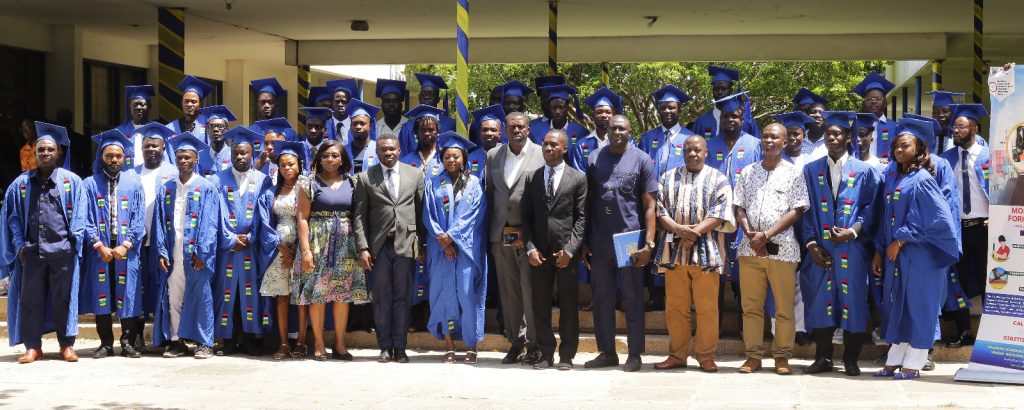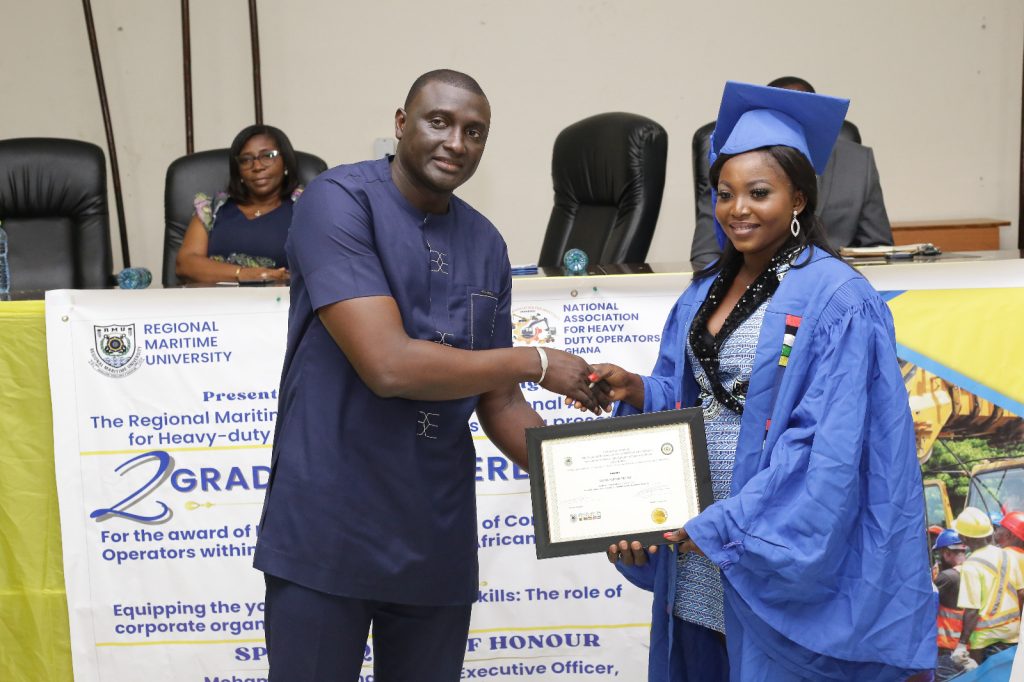By Morkporkpor Anku
Accra, Oct. 27, GNA – Mr Ohene Addo, Operations Manager for Meridian Ports Services, has urged Corporate Organisations to prioritise youth development as part of their corporate social responsibility initiatives.
He said getting skilled youth was the responsibility of all and it would serve as a win-win situation.
Mr Addo was speaking at the second graduation ceremony organised by the Regional Maritime University (RMU) and the National Association for Heavy Duty Equipment Operators in Ghana (NAHEOG) in Accra.
The theme for the graduation was” Equipping the
Youth with Employable skills. The Role of Corporate Organisations.”
The RMU in collaboration with NAHEOG train young people to acquire skills in Forklift and Mobile Crane Operation for the award of a professional certificate of Competence for operators within the West and Central Africa Sub-region.
He called on the institutions to also help change the mindset of students towards internship and training programmes.
“Internship is not a guarantee of employment but a means to improve on your skills and knowledge to prepare you for the job market. The focus must be on skills development,” he added.
Mr Addo said the youth and graduates to get themselves equipped with employable skills depended on what they as an individual would do, indicating that 90 per cent depended on themselves.
“There are a lot of limitations to employment and this you would have to work hard to remove,” he said.
He said in the current or modern state of running a profitable business or organisation, companies and business owners were constantly thinking of innovative ways to optimise their resources and manpower.
He said this being the focus, equipping the youth with training and development opportunities aimed at enhancing their skills was something that must sit as a priority for the youth.
Dr. Baboucarr Njie, the Registrar at RMU, who represented the Acting Vice-Chancellor, said the feat being currently witnessed was a demonstration of the determination, resilience and hard work put in by the graduates.
“It is also a testimony of the foresight of the initiators of this beautiful dream which culminated in the MOU that has blossomed into this ceremony today,” he said.
He commended the instructors and resource persons, who delivered the modules and practical
training to the trainees.
He also commended the leadership of NAHEOG for their continuous forward strides towards more programmes.
The Registrar said the University’s partnership and the strides registered so far was indeed a demonstration of the power of a working MOU and encourages them as a University to enter more of such for immediate impact to society.
Dr Njie said the RMU had been steadfast in its mission to equip the youth with the skills and knowledge required for meaningful employment.
“Our commitment to quality education and professional training is reflected in the success stories of our graduates across the region both in the Member states and non-member states of the RMU and indeed across the entire globe,” he added.
He urged them to continue to pursue knowledge punctuated by skills, and embrace lifelong learning to match the changes in science and technology in
the rapidly evolving world.

Mr Dominic Kofi Eyiah, National President of NAHEOG said the youth represented the future, and it was crucial that “we prepare them with the skills and knowledge needed to succeed in the workforce.
“Corporate organizations play a pivotal role in making this a reality,” he said.
He said in a rapidly evolving global economy, the demand for skilled and adaptable workers was continuously increasing.
The National President said the youth, with their fresh perspectives and energy, were an invaluable asset, however, without the right skills, they could find themselves ill-prepared to meet the challenges of today’s job market.
“This is where corporate organizations can make a significant difference,” he added.
He said Corporate organizations had the resources and expertise to provide specialized training and
development programmes, where they could partner with educational institutions to create curricula that aligned with the current job market demands.
These programmes can focus on both hard skills, such as technical proficiency, and soft skills, such as communication, problem-solving, and teamwork.
He said by tailoring educational initiatives to real-world needs, Corporate organizations helped bridge the gap between theory and practice.

Moreover, Corporate organizations could offer internships, apprenticeships, and mentorship programmes that provide practical, hands-on experience to young individuals.
He said this exposure was invaluable, as it did not only teach them the specific skills needed for a particular industry but also cultivated a strong work ethic and a deep understanding of the corporate culture.
GNA